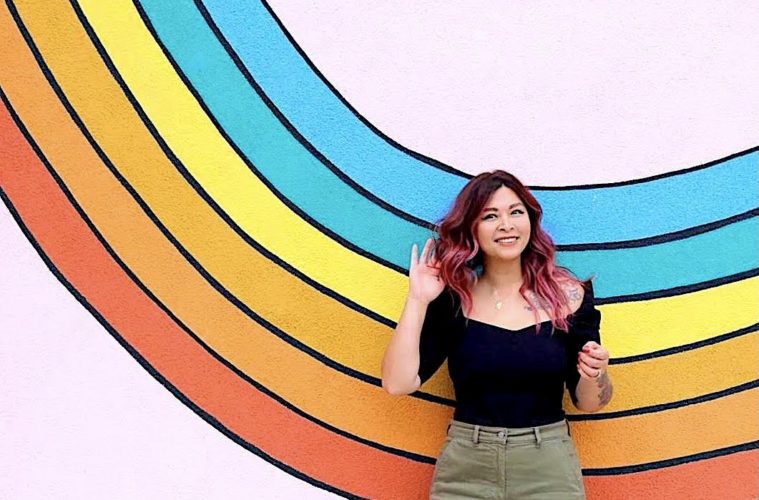Now that COVID-19 seems to be going into an endemic phase, a lot of us are reflecting on what we all went through when the virus was at its worst. Life changed, and it’s not clear if it will ever go back to the way it was. Our daily routines, our relationships with others, our priorities, our personal style, grooming and general well-being were all reconsidered and disrupted as we faced a disease that could very clearly be deadly, despite what our government was saying early on. Though the number of coronavirus-positive patients in Los Angeles County hospitals has fallen below 1,000 at press time and officials have relaxed L.A. County’s indoor mask mandate for vaccinated people, we are still facing it. But vaccines are keeping us alive, and helping to keep local businesses alive in the process. As death and illness continue to decrease, things that weren’t considered essential, such as L.A.’s beauty service industry and self care options are starting to get prioritized again in our budgets. They were some of the hardest hit in Los Angeles during coronavirus times due to the public’s fears, financial hardships and wavering CDC, the state of California and L.A. County Health Department guidelines.
Though this portion of the workforce never got the attention that restaurants, nightlife, music and the entertainment industry did, the closures made a huge dent in the local economy– there are over 50,000 establishments and over 560,000 individuals licensed by the California Board of Barbering and Cosmetology alone. Hairstylists, mancurists, facialists, med spa nurses, and more, were some of the worst affected in L.A., and most struggled to maintain personal finances as well as client relationships when salons, spas and parlors were forced to close and reopen multiple times with fluctuating restrictions.
Consistency –something we all missed during coronavirus’ height– will be the key for local businesses, including this segment, as we (hopefully) return to normal. With Governor Newsom’s recent implementation of the SMARTER plan, once-thriving beauty and wellness-oriented businesses hope to do just that. But what have those in this sector learned so far and what kind of “makeover” (mind and body) will help us all move forward? LA Weekly asked several local beauty professionals and proprietors to share their struggles, thoughts and hopes for the future.
(Click hyperlinks for booking and more info)
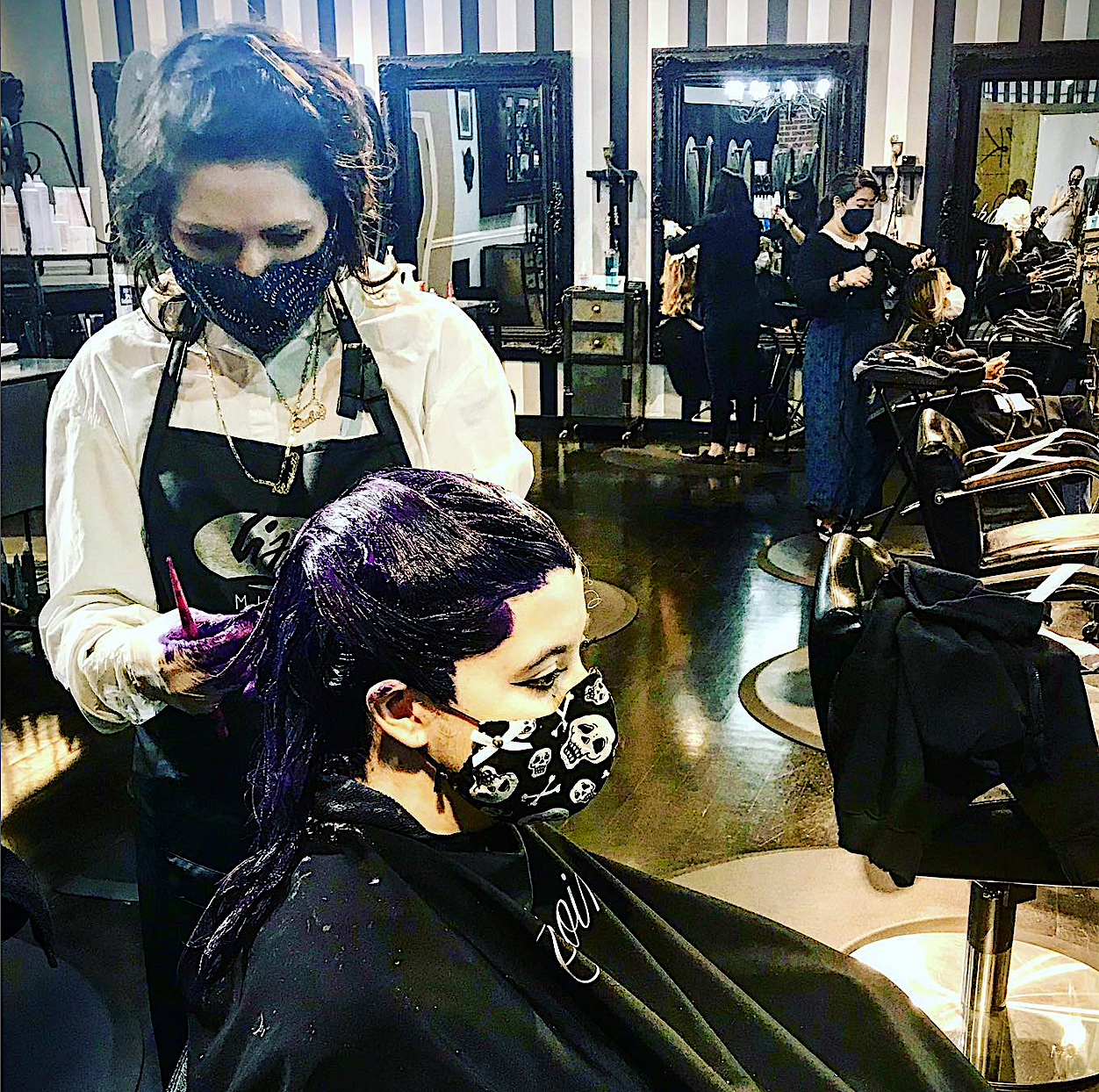
Janine Jarman at work. (Lina Lecaro)
STRESSES & TRESSES
When COVID-19 first reared its ugly head in early 2020, some didn’t take the virus as seriously as others. Most of us stocked up on non-perishables, toilet paper and Clorox then bunkered down and nested at home, limiting social interaction to Zoom meetings and Facetime. Others were less concerned, and even seemed inconvenienced by quarantine; continuing to congregate at parties, get-togethers and whatever was still open at any given time. The latter still had a reason to care about how they looked, but most of us essentially let ourselves go. Indulgences like mani-pedi’s, hair cuts and color, waxes and facials were the last thing on our minds and these services seemed like the riskiest anyway. But were they?
“It was total chaos,” shares Janine Jarman of Hollywood’s Harroin Salon, the popular Cahuenga Blvd. salon, known for its wild color and cool cuts. “Waiting to hear from the state and city if we needed to close… our business slowed down so much in the weeks leading up to the final word that we needed to shut down. Then it took weeks of round-the-clock calls and hours upon hours of hold times, calling all of our utility, credit cards to let them know we needed an emergency hold on everything, [and] managing the fear and unknown for my staff.”
Jarman also had a New York location, so the struggle was two-fold. She says in general, the guidelines for re-opening were completely unrealistic and unnecessary, requiring stylists to wear goggles, disposable smocks, masks, and gloves. “Also with the capacity limits, I lost a lot of staff because their income was limited,” she adds. “Overall it’s been pretty devastating both financially and emotionally.“
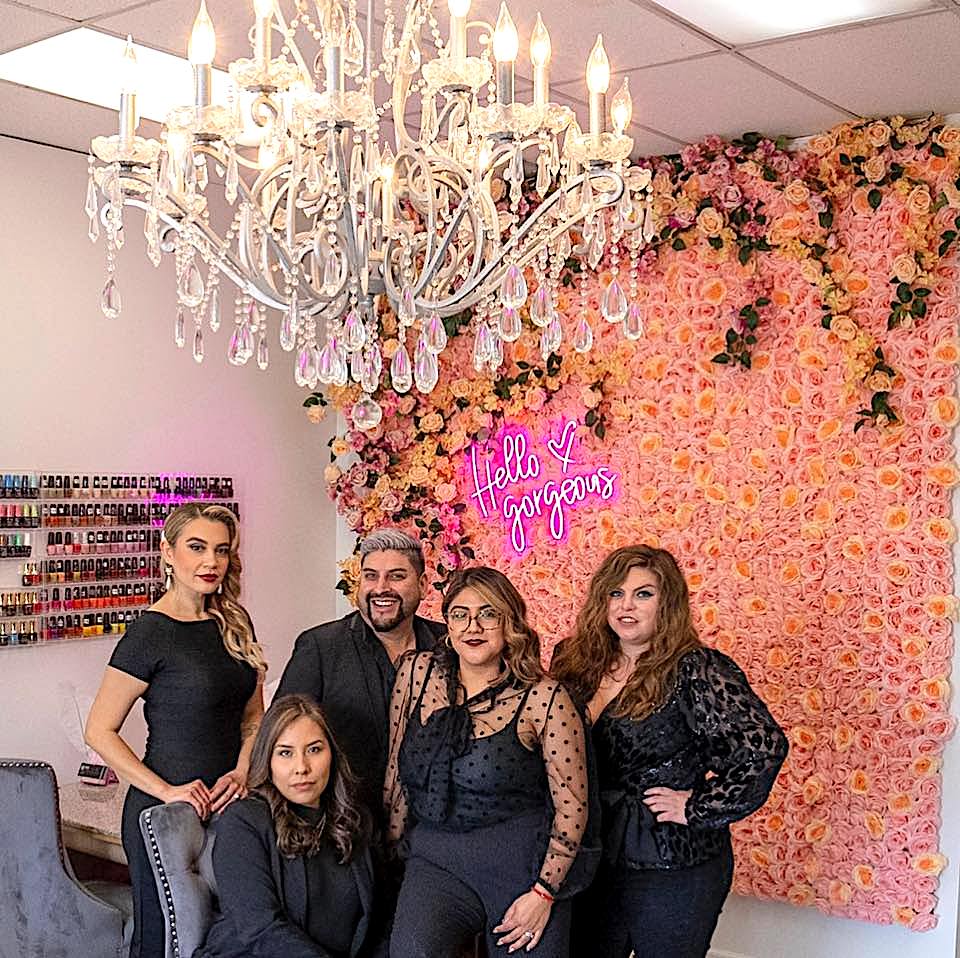
Manuel Saucedo (center) and his team (Courtesy Risque Beauty)
One of the biggest challenges salons face, and still face is the fact that people are not on the same page about vaccines and masks. Jarman’s salon has been HIPAA (Health Insurance Portability and Accountability Act) complaint for the past 16 years, which means that all confidential medical info is private. Having to police vaccine status for both staff and clients, all in a masked environment, has been difficult to say the least. “The brunt of enforcement was put on the shoulders of small businesses,” she adds. “And that ends up leaving staff and patrons divided.”
Manuel Saucedo of Risque Beauty in Redondo Beach had been more successful than ever pre-pandemic with bookings line-up months in advance, then it all ceased. “All the changes were frustrating to say the least,” he adds. “People who did not know our profession were making decisions that impacted our industry without consulting us—at least it felt that way. Our profession requires 1,600 hours of education that encompasses sanitation and public health before we can become licensed with the State; the only thing that really changed from that was the requirement of face masks. What the public didn’t see was how the government failed small businesses. Yes, there were PPP loans, but that only covered two or three months of rent. It was a short-term solution to a long term situation.”
“All the closings and reopenings made for an up and down roller coaster of emotions,” concurs Gregga Prothero of Gregga LA. “It was challenging, especially dealing with the few loud anti-mask clients that booked appointments. Throughout though, I realized I love doing hair and missed getting to see my clients. I couldn’t imagine doing something else. “

(Courtesy Gregga LA)
For Prothero, the pandemic couldn’t have come at a worse time either. She signed the lease to start her new salon buildout –inside the new hip new Verdugo Plaza shopping Center– on February 28th, 2020. When the shutdowns started in March and everything was halted, her business and her new building permit got caught in limbo. “I thought, do I want to declare bankruptcy to get out of the lease and postpone the dream I’ve had since a teenager?” she shares. “It was a very scary time and often I couldn’t help but question why I wanted to keep going. But we were very fortunate to have understanding landlords that worked with us to make sure we could continue the buildout and made a fair compromise that helped us to eventually open.”
Like most salon owners and stylists, Prothero had to get creative when it came to bringing in revenue. “I had gift cards. I also made custom take-home color kits for existing clients,” she says. “I tried to make it an experience, by making the kit aesthetically pleasing, using a cute gift box, gloves and instructions on how to apply the color. I also wanted to do this for clients who were essential workers. They needed a way to feel good while being out there. Clients, friends and family purchased them and I was pleasantly surprised. I really got to see the kindness in people during a challenging time.”
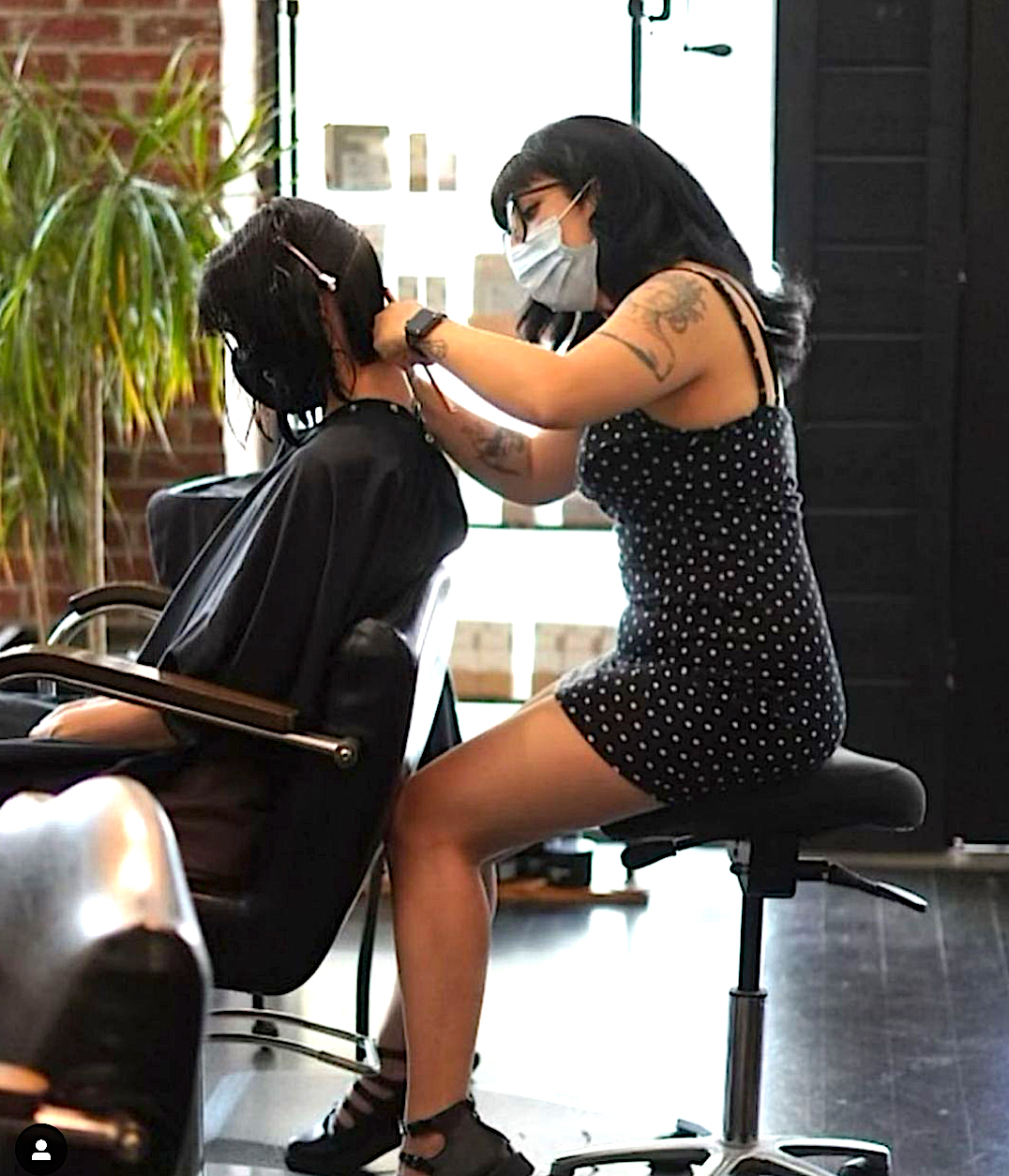
(Courtesy Hairroin Salon)
Similarly, Dede Ford of West of Heaven salon in Culver City, says she was only able to sustain her business due to the support of her clientele. “My experience has been a surprising and surreal eye opener,” she explains. “I didn’t really realize how loyal and caring my client family was until I was forced to close down. Times got a little hard and I wasn’t sure how long I could stay afloat but my clients checked on me and even offered to pre-pay for future services. I was truly blessed. The shutdown was needed as were closures and regulations. I was for it, but they should have considered each business closure case by case. Professional salons always promote health and safety. “
Hands-on personal care services already took more precautions than most pre-pandemic, following strict cleanliness and sterilization regulations via the state. Regardless, they were not only deemed non-essential; they were the last to re-open. When they finally did, they endured the hardest guidelines and the most mixed messaging. Most of us were getting in touch with our roots, or taking a DIY approach to our looks in 2020, but privileged celebrities like Heidi Klum had their stylists come to them (even if they were wearing the equivalent of hazmat gear in social media posts) or they had salons open up privately like Nancy Pelosi did, to understandable backlash. Both got dragged for their choices, but some might argue, they needed the upkeep for professional reasons. In any case, people who could afford it were surely doing the same even if they didn’t share it or get caught.
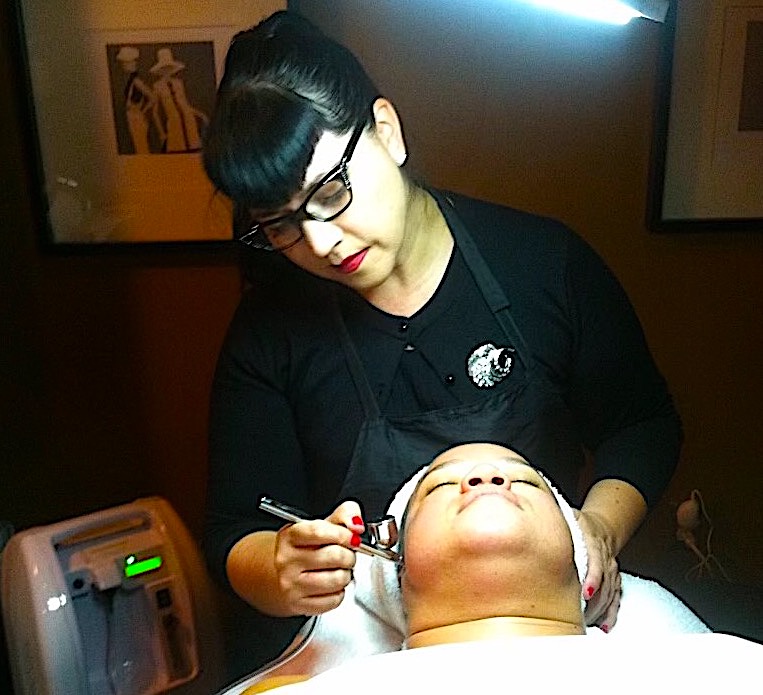
(Courtesy Dollface Skincare Studio)
FACING IT
It wasn’t just the hair salon sector that took a blow in California and beyond. From estheticians to waxers, lash extension specialists to microbladers, injectables technicians to nail artists, and even tattoo artists– hands on body service providers dealt with the strictest guidelines of all and many brick and mortar spaces did not survive.
“The beauty industry most definitely took a big hit especially skincare services as we were one of the last services to reopen,” says Lila Castellanos of Dollface Skincare Studio in Atwater, who had a hand in mobilizing and getting answers for her L.A. County peers when things were uncertain. She worked alongside Wendy Cochran, founder of the CA Aesthetic Alliance, which advocates for all estheticians in the state. “We all had to stand up for our industry,” Castellanos says. “The outbreak initially caused my business to shut down pretty quickly after being announced. We had 4-5 open/closures making it very hard to run an efficient schedule.”
Since her studio finally reopened in April of 2021, masks are required until she removes them right before the facial service. “I’m a solo Esthetician and I only have one client and myself in at one time, so distancing from others is just fine. “
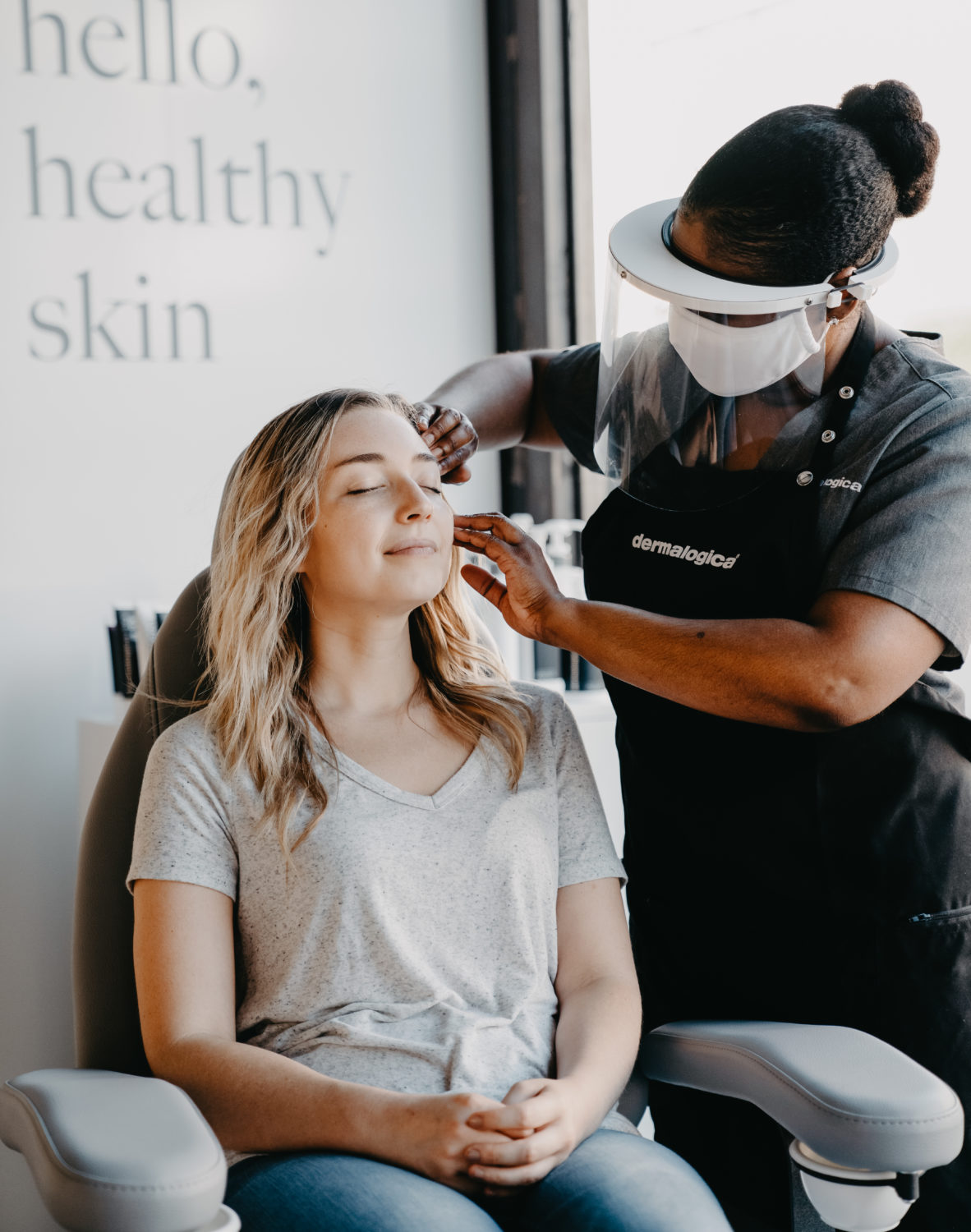
(Courtesy Dermalogica)
Small businesses like Dollface obviously had challenges, but bigger, more well-known brands were forced to adjust and adapt too. The popular California skincare company Dermalogica, which has studios in West Hollywood and Santa Monica, tell us they also worked to navigate the guideline changes in the past two years as well. “We had to be extremely flexible,” Dermalogica’s Director of Retail Concepts & Operations Chastity Brown tell LA Weekly. “We created “Clean Touch” guidelines that the stores immediately implemented that allowed us to provide a safe environment for our staff and clients during these ever-changing times. There were points when we were not able to offer facial services to our clients, but physical touch is a large part of what we do.”
“With the shutdown of services, we had to solely rely on our retail products to get sales,” Brown continues. “We are based in a great community with amazing clients that realize the importance of shopping in-store versus online. We also were able to shift to offering digital, guided self-performed services with product we would ship directly to the client prior to the appointment.”
In person and in-store service will always offer a more special, personalized touch, but during pandemic a lot of us looked online to maintain skincare and beauty regimes, so much so that the newer business models such as subscription beauty boxes and do it yourself products saw surges in sales. In terms of skin maintenance, Hollywood starlets and influencers surely had the means to keep up their botox, fillers and dermatology fixes on the down low, not to mention the trainors and chefs to help them avoid the “quarantine 15” as weight gain in 2020 and 2021 was hashtagged. There was also “maskne” (facemask caused acne) to deal with for normal folk who look face coverings seriously and suffered from sensitive skin.
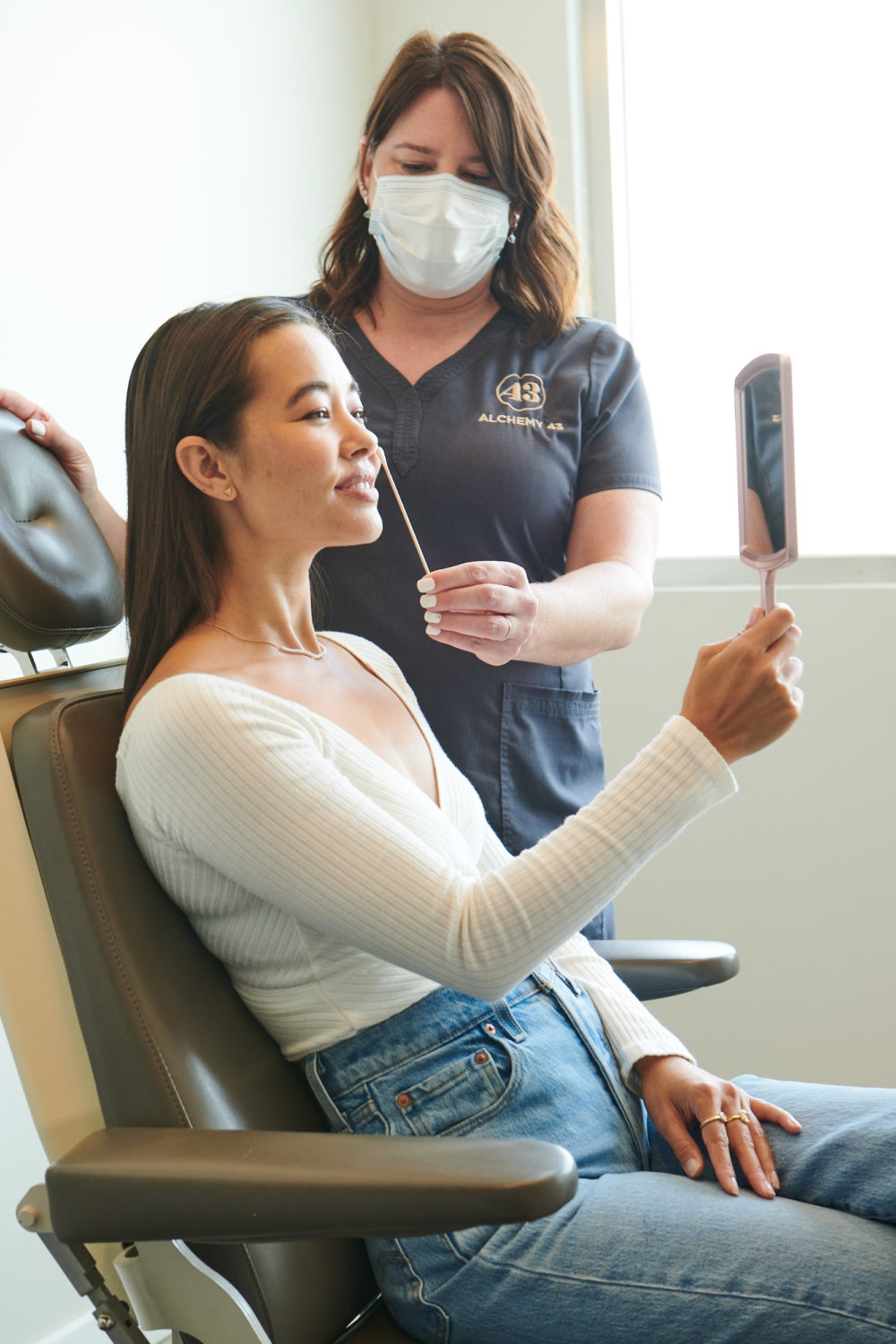
(Courtesy Alchemy 43)
Alchemy 43, which specializes in cosmetic injectables or as they like to call them “microtreatments,” touts affordability and natural results, but like other salons and studios, last year was difficult for them. Social media was one of the most obvious ways the company stayed on the radar while they were closed and when they reopened, discounts and BOGO deals have made them a popular outlet for those who are finally ready to have their mugs on display again.
“We did everything we could to stay connected to our clients and community and ensure the safety of our employees,” says Nicci Levy, Founder and CEO. “As soon as allowed, we reopened our doors and operated within the health & safety guidelines laid out by healthcare officials. Because we are a medical aesthetics company, clients have felt safe returning due to our rigorous and stringent safety standards.
Offering services including microblading, freckle tattoos, plasma (Fibroblast) skin tightening, skin tag/sunspot removal and tooth gems, Vanessa Decker of I Heart Killer Beauty says business is improving for her services as well, but she did notice a few changes along the way. “First, the pandemic lightly thinned the herd on artists,” she observes. “A lot of gals I was working with in the studio I was at have fallen off or moved. Second, when the pandemic was in its prime and we were allowed to begin work again, any treatment that required someone to have no mask on, like plasma skin tightening treatments, from the nose down and even tooth gems, almost fizzled away. That was a challenge for a while and probably the lowest point for me and what I do.”
Still, there was one positive side effect during the pandemic for her biz too. “ I’ve noticed a spike in people having eyebrows done,” she reveals. “It really became more important. The eyes are one of the only things you can see outside of your mask. Microblading has always been popular, but now it’s even more so due to the mask wearing.”
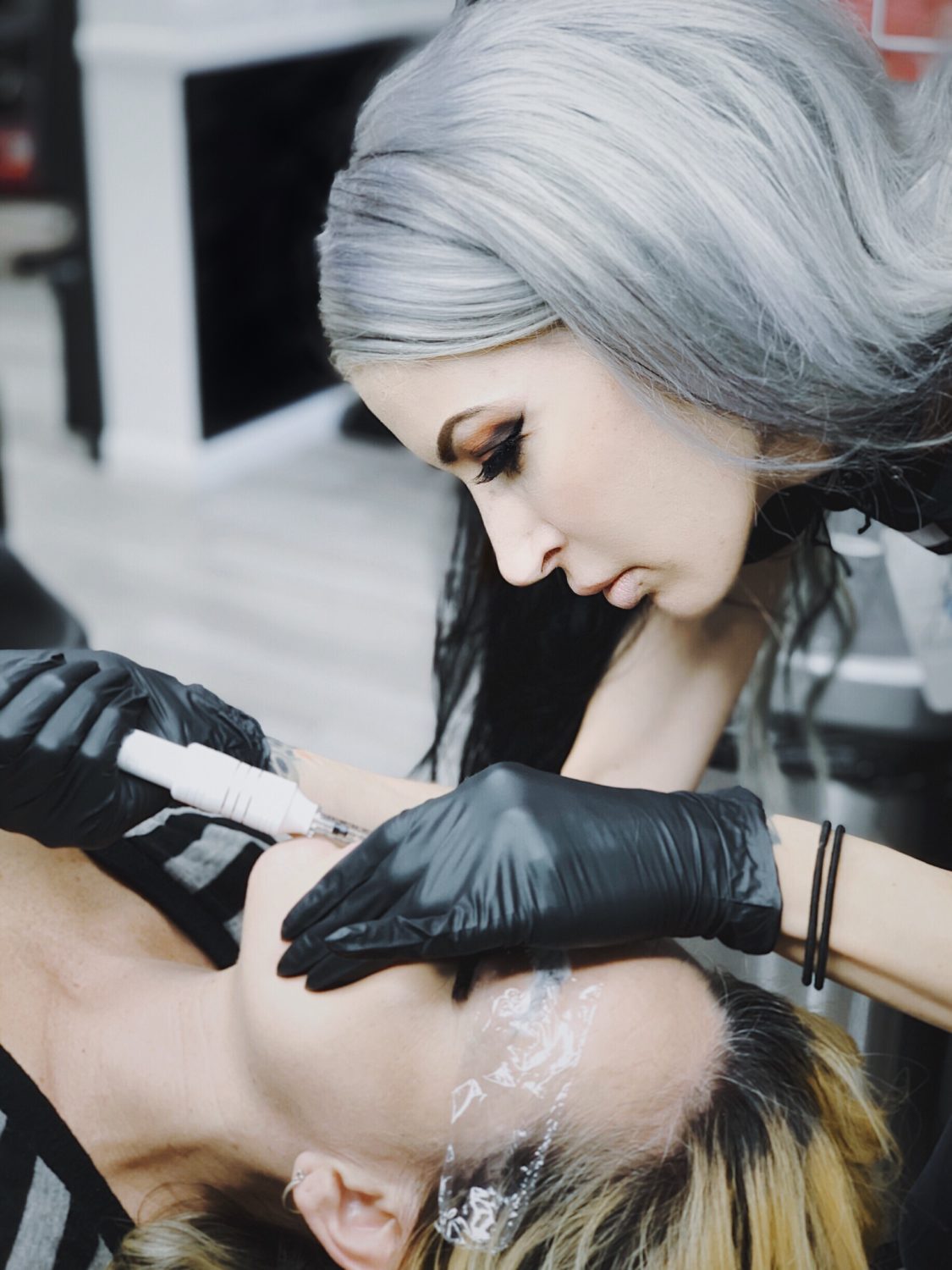
(Courtesy I Heart Killer Beauty)
Indeed, pre-pandemic, microblading (in which individual hairs are hand-drawn and simultaneously implanted with pigment into the brow line via fine needles resembling the shape of a blade -called a microblade) was arguably the hottest new beauty service trend out there. It was so popular that brows-only studios opened up all over L.A.
Crispy Brows in Silver Lake, where Decker worked before the pandemic, was one such success story. But due to the multiple closures and dealing with some clients who wouldn’t abide by COVID-19 guidelines, owner Roxanne Crisp ultimately had to close last year.
“I’ve been in the beauty industry for 14 years, specializing in esthetics and hyper natural cosmetic tattooing,” says Crisp. “Since I started cosmetic tattooing about 7 years ago our industry has exploded. In the beginning of the pandemic l really wasn’t sure how things would pan out. As most people know, landlords were hard on many small businesses. Moving out of that space was the smartest financial decision even though it felt very close to failure. I was so afraid of what others would say or think, that it would have a negative reflection on my business. But I stood up and kept moving forward.”
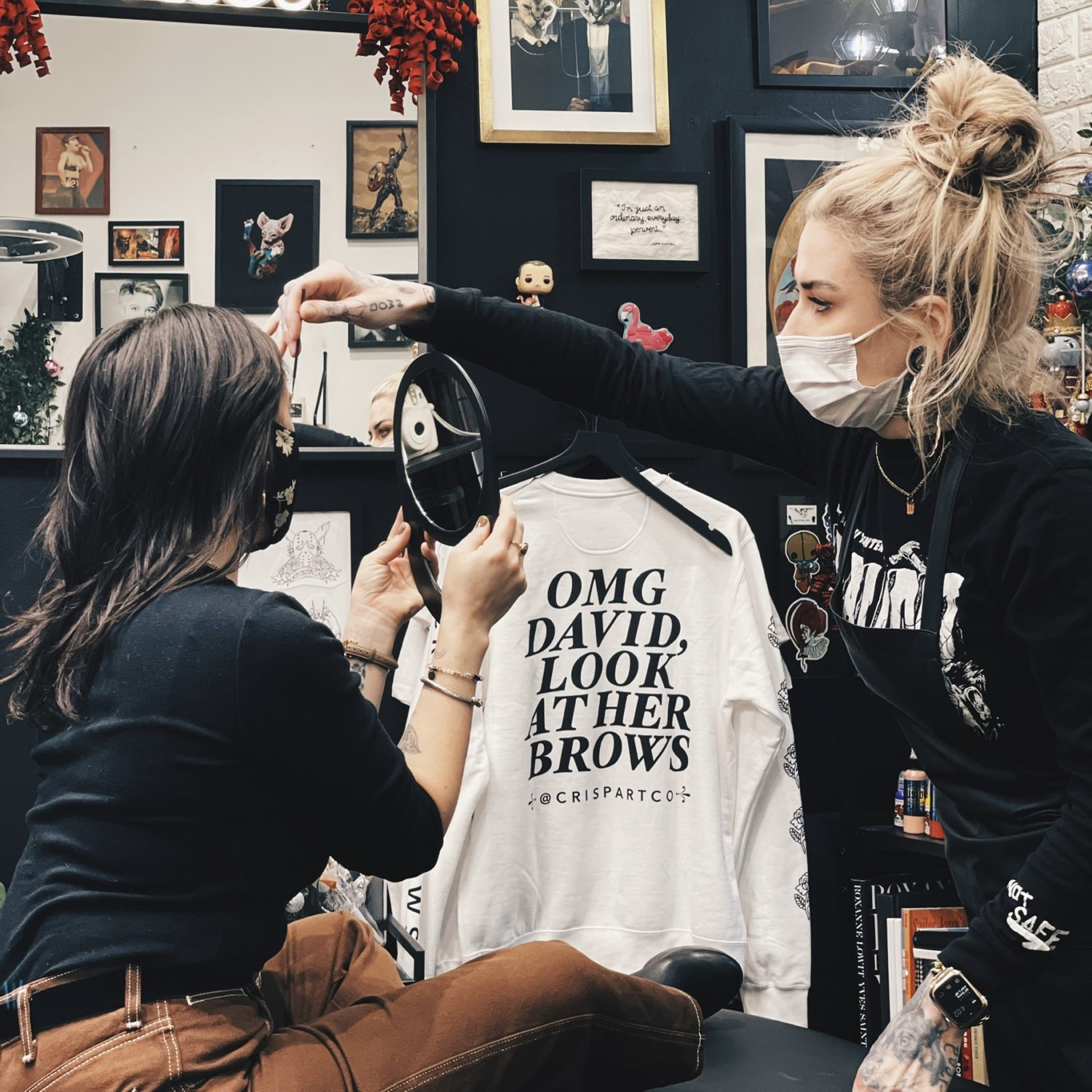
(Courtesy Roxanne Crisp)
Decker now works out of Brow Artistry Studio in Los Feliz, Crisp is at Salon Republic in Burbank, an umbrella for independent small businesses within the beauty industry. “It’s been such a wonderful place to call my second home,” she enthuses. “I have two suites with one resident artist. Our operation has been so simple and smooth. With all the stress of the pandemic and changes in our industry having less responsibility has lifted a huge weight… it’s much easier to focus on being an artist or creative.”
Still, Crisp echoes with pretty much everyone we spoke to about how her industry was not considered during COVID’s height. “I was in disagreement with waiting to reopen as long as we did because I believe we are one of the safer industries,” she says. “We already use PPE everyday for every client. I’ve worn a mask while working for 14 years. Dog groomers were essential but not beauty professionals, how does that make sense? I can’t deny at times I let frustration get the best of me. But a world pandemic is out of everyone’s control so I kept reminding myself I was not, and am not alone. I made sacrifices when they needed to be made, no matter how difficult but I truly believe that helped me push through. I wanted to give up, but I didn’t want to fail. I love what I do and I wasn’t going to let these unfortunate times stop me. I’m very happy to say, our studio has been overwhelmingly busy and we couldn’t be more grateful.”
Courtney Casgraux, founder of GBY Beauty in Silver Lake, known for signature lash extensions and waxing services, felt similarly about the shutdown. But what she found more disturbing was the lack of relief or support for independent contractors, which all of her employees happened to be. Coupled with the disastrous AB5 Bill, which saw many freelancers fired from their part time gigs due to regulation of companies who use them, the pandemic forced many in the field to reconsider their profession.
“I’d like California State and the California State Board of Barbery and Cosmetology to take some responsibility and be held accountable for the loss and damages of the businesses that were effected in the beauty space during Covid 19,” she insists. “What we know now is what we knew then in April of 2020– and that’s to wear a mask and sanitize. So many businesses didn’t survive and many many beauty professionals waited weeks for some type of monetary compensation to survive. It’s not right, it still is not right as the same questions go unanswered and uncertainty looms. We still say ‘what if we get shut down again,’ and it’s two years later. We need strong leadership with a solid plan and formidable answers.”

(Courtesy Blackheart Nails)
CLAWING BACK
Like beauty parlors and face spas, nail salons seem to be back on the road to recovery. But the memories of last Summer’s parking lot manicures and press-on fails won’t soon be forgotten, and many of the plastic partitions added to nail stations as an extra layer of protection, remain.
One of the most popular nail artistry hubs, Nail Swag, was forced to shutter permanently due to COVID, though the studio’s artists did find new life, including Natalie Minerva, who’s a hot ticket independently thanks to her nail work on Euphoria.
“It was pretty rough there for a while,” recalls Lauren VonLipstick of Blackheart Nails. “Luckily our clients were very excited to return with all the new safety procedures we had put in place.”
Nail salons were required by law to have sanitation practices in place even before the pandemic, so the nail artist says she was well prepared for heightened safety procedures.. “We are already in the habit of cleaning and sanitizing between clients, as well as wearing masks and gloves,” she says. “The biggest change was our clients also wearing masks and having temperature checks when they came in.”
The Paycheck Protection Program (PPP) helped as did an understanding landlord which allowed VonLipstick to keep her lease. While she was closed she also continued to post her vibrant nail art on her social media, which generated interest for when she finally came back. “The local beauty community definitely felt the effects of prolonged closure but it has been amazing to see how much support we have gotten,” she says. “People really love and appreciate their beauty service providers and I’ve seen clients rally around us to ensure that we can keep our doors open and help people feel their best.”
COVID-19 is not completely behind us, and the stresses of life, financial and personal, not to mention distressing world news and societal conflicts, can take a toll on our collective mental states. Physical maintenance and pampering is more essential than ever, even if some consider it frivolous or excessive. The value in self-confidence and positive vibes can’t be overstated. Which is why supporting the beauty service industry promises one of the biggest boosts to the local economy. Nothing shows viability more than new business growth, and it’s encouraging to see new salons continue to pop up post-pandemic.
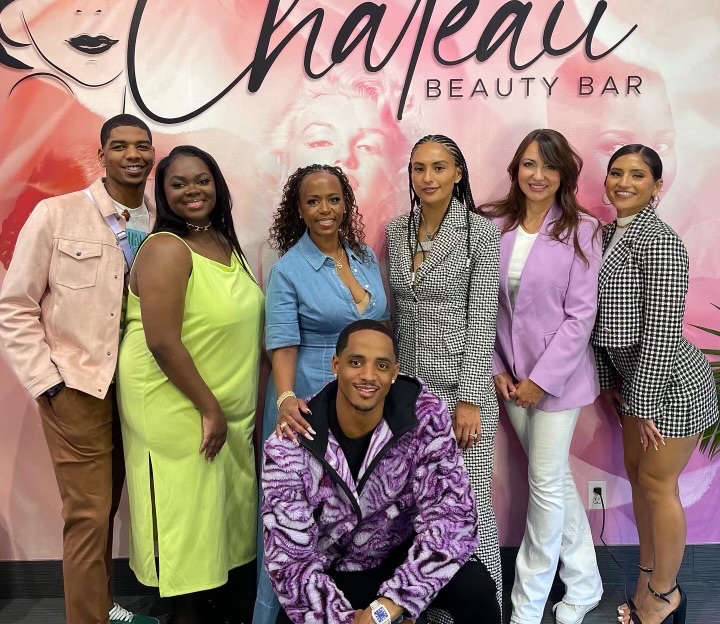
(Courtesy Chateau Beauty Bar)
Like the brand new Chateau Beauty Bar, which just opened this month in Santa Monica. “The idea of Chateau has always been in the works, and COVID-19 didn’t have any impact on the delay,” shares co-founder Cori Broadus. “We picked February 11th as the opening date because it was truly a family week, from my dad buying Death Row Records to performing at the Super Bowl. We felt it was the perfect weekend to open the family business.”
Yes, Chateau is the latest business venture for the family of Cordozar Calvin Broadus, Jr. (aka Snoop Dogg). The Aveda-based salon caters to all hair types and races and offers facials, waxing, and lashes; and they’ll be expanding to nail care in the Spring. “We are catering to all skin types, hair textures, and races,” says Broadus. “We do not discriminate; we are here to cater to you and make sure you feel comfortable and relaxed the entire time. Chateau is not just a salon; it is an experience.”
In the wake of the pandemic and the subsequent BLM protests, beauty businesses and Black-owned businesses both have seen struggle. The brand new Black-owned salon, backed by one of the most business-savvy families in Los Angeles after two years of uncertainty, signals hope. “While I think it’s always essential to shine a light on black-owned businesses as well as empower people in every sector of the business world in general, we come from the mind-set of trying to always highlight and shine a light on successful stories/businesses because sadly we have seen people more often than not focus on the negative,” says Broadus. “Just as racism occurs every day in our society, we need to show the world what is available to them to continue breaking the stigma around black-owned businesses and empowering people to stay strong, work hard and empower the next generation. While Chateau Beauty may be a black-owned business, it is not just for black people; it is designed for everyone, a place for everyone to be included.”
Bringing people together to feel good about themselves inside and out, is what it’s about for all of the salons, spas and self-care studios of L.A. Despite the preconceptions, they were and continue to be some of the safest spaces you can enter and patronize. No matter what happens with COVID in the future, the industry proved it had the drive and loyal customer base to survive. Watching these business owners and their employees start to rebuild and succeed after everything they’ve been through the past two years is, like the work they provide itself, a beautiful thing.
Advertising disclosure: We may receive compensation for some of the links in our stories. Thank you for supporting LA Weekly and our advertisers.

